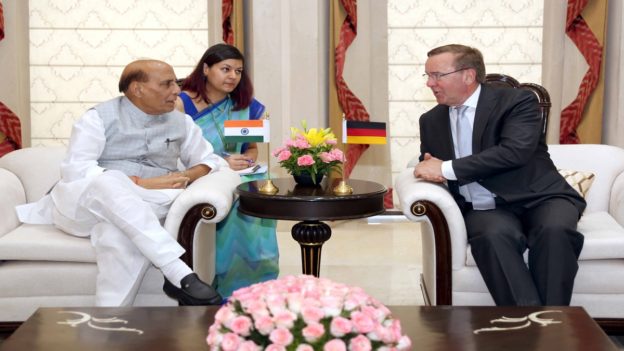The Request for Proposal (RfP) for these submarines has been extended up to August 2023 and the German company TKMS is one of the contenders.
Strengthening defence cooperation and further enhancing industrial partnership were the focus of talks between Indian and German defence ministers in New Delhi. During the discussions, defence minister Rajnath Singh urged the German defence companies to invest in two Defence Corridors located in Uttar Pradesh and Tamil Nadu.
Defence Minister Rajnath Singh and his German counterpart also talked about Germany’s ThyssenKrupp Marine Systems (TKMS) plans to participate in Indian Navy’s Project 75 (I) to acquire six next-generation stealth conventional submarines, in a deal worth US$ 5.8 billion. The Request for Proposal (RfP) for these submarines has been extended up to August 2023 and the German company TKMS is one of the contenders. Germany is keen on closing this deal through government to government process.
TKMS is one of the two companies in the world which has a “sea-proven” fuel cell Air-Independent Propulsion (AIP) which is one of the specifications mentioned in the RfP issued by the Ministry of Defence in 2021. Financial Express Online has reported earlier that theoretically this can be met by TKMS and Daewoo Shipbuilding and Marine Engineering (DSME) of South Korea.
The German company has decided to partner with Indian shipyard Mazagon Dock Limited (MDL) in Mumbai.
In his talks with his German counterpart Boris Pistorius, Singh also highlighted the potential opportunities in the defence production sector and emphasized the scope for German investments to bolster India’s supply chains and contribute to the resilience of the defence ecosystem. By participating in the supply chains of German defence industries, the Indian defence sector can add value and foster stronger supply chain collaboration.

Singh emphasized the symbiotic nature of the relationship between India and Germany, highlighting the shared goals and complementary strengths of both nations. India’s skilled workforce and competitive costs, coupled with Germany’s high technologies and investment capabilities, provide a strong foundation for further strengthening ties between the two countries.
In his maiden visit to Asia since becoming a defence minister of his country earlier this year, German defence minister Boris Pistorius arrived in India on a four day visit accompanied by a high level delegation of representatives of German defence companies. Ahead of his arrival in New Delhi, he said that the visit is aimed at bolstering security ties between the two countries.
The German minister reached New Delhi from Jakarta where he had held talks with his Indonesian counterpart Prabowo Subianto. And on Sunday he participated in the Shangri-La Dialogue in Singapore.
India and Germany have maintained a Strategic Partnership since 2000, with Inter-Governmental Consultations further reinforcing the relationship since 2011 at the level of Heads of Government. The bilateral meeting witnessed the participation of senior officials from both ministries, including the Defence Secretary and the Chief of Defence Staff from India, as well as the State Secretary from the German Ministry of Defence.
This visit marks the first time a German Defence Minister has visited India since 2015, highlighting the significance of the discussions. The meeting commenced with a Tri-Service Guard of Honour, symbolizing the respect and warm reception accorded to the visiting dignitary.

Following the bilateral meeting, Pistorius is scheduled to travel to Mumbai, where he will visit the Headquarters of the Western Naval Command and MDL, further emphasizing the importance of maritime cooperation and defence industry engagement.
Submarines for the Indian Navy
The submarines under Project 75 I will be built in India under a joint venture and transfer of technology with an international manufacturer. Since the Project 75 I is based on the Strategic Partnership model, therefore the foreign Original Equipment manufacturer (OEM) will work together with MDL and Larsen & Toubro which has been identified as one of the possible Indian partners.
It has also been reported earlier that the last time Germany had signed a major deal with India was for four HDW Type 209 submarines in the 1980s.
Before arriving in India, the German minister told the media “I will be accompanied by representatives of German defence industry companies and I want to send a signal that – we are willing to support our reliable partners like Indonesia, like India. And that includes the possibility of delivering submarines, for example.”

A
How can India and Germany collaborate in the Indian Navy’s Project 75I?
Technology Transfer: Germany has a strong track record in submarine construction, particularly with its renowned Type 212 and Type 214 submarines. And the European nation can transfer its advanced submarine technology to India, enabling the country to develop indigenous capabilities in submarine design, construction, and maintenance.
Design Expertise: Germany’s experience in designing and building state-of-the-art submarines can greatly assist India in developing the specifications and design for the Project 75I submarines, as its expertise can ensure that the submarines meet India’s specific operational requirements, incorporating advanced features such as stealth technology, improved sensors, and enhanced endurance.
Engineering Support: The engineering companies can collaborate with Indian shipyards in the construction and integration processes. They can provide technical support, guidance, and quality assurance to ensure the submarines are built to the highest standards. And this collaboration can enhance India’s shipbuilding capabilities and lead to knowledge transfer in areas such as welding, hull construction, and propulsion systems.

System Integration: Germany can assist India in the integration of complex subsystems and weapon systems into the submarines. This includes areas like propulsion systems, communication equipment, sonars, torpedo launch systems, and combat management systems.
Lifecycle Support: Germany’s experience in submarine lifecycle support, including maintenance, repair, and overhaul, can assist India in establishing a robust support infrastructure for the Project 75I submarines. This would ensure the submarines remain operational and effective throughout their lifecycle.
https://www.financialexpress.com/business/defence-india-and-germany-discuss-submarines-and-investments-in-defence-corridors-3115685/





